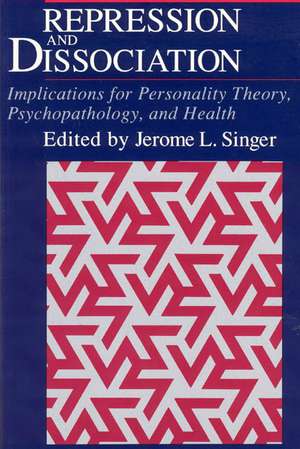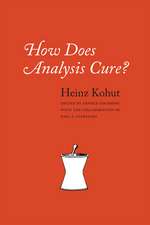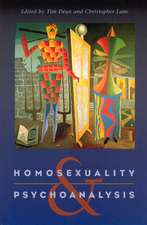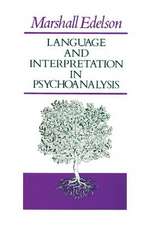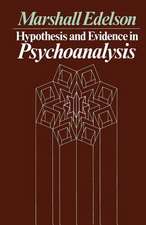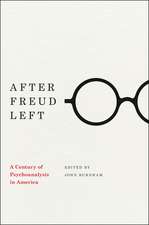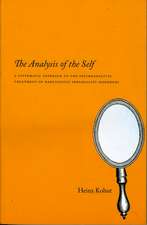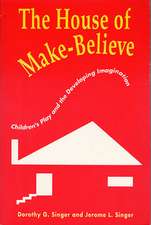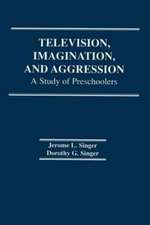Repression and Dissociation: Implications for Personality Theory, Psychopathology and Health: The John D. and Catherine T. MacArthur Foundation Series on Mental Health and Development
Autor Jerome L. Singeren Limba Engleză Paperback – 12 iul 1995
This book features contributions from twenty six leading experts that survey the theoretical, historical, methodological, empirical, and clinical aspects of repression and the repressive personality style, from both psychoanalytic and cognitive psychological perspectives.
"Rarely does a volume present contributions on a controversial topic from such distinguished clinicians and experimentalists . . . . There is something of interest in this volume for almost anyone involved in experimental cognitive psychology and psychiatry."—Carroll E. Izard, Contemporary Psychology
"The concept of repression is the cornerstone of psychoanalytic theory. . . . This is a delightful book, unusually well-written. . . . Recommended."—Choice
"Readable, thorough, wide ranging and consistently interesting. . . . A testament to the continuing power of psychodynamic ideas when faced with individual psychopathology."—Sue Llewelyn, Psychologist
"Singer has brought together some of the best empirical research in the areas of unconscious mental activity and repression—that is at once interdisciplinary and scholarly."—Howard D. Lerner, International Review of Psycho-analysis
"A rich reference, replete with summaries and citations, covering a variety of topics related to the psychology of repression and dissociation. . . . A thoughtful, detailed and eclectic discussion of the scientific and theoretical basis of repression and dissociation."—Steven Lazrove, M.D., American Journal of Psychiatry
"Rarely does a volume present contributions on a controversial topic from such distinguished clinicians and experimentalists . . . . There is something of interest in this volume for almost anyone involved in experimental cognitive psychology and psychiatry."—Carroll E. Izard, Contemporary Psychology
"The concept of repression is the cornerstone of psychoanalytic theory. . . . This is a delightful book, unusually well-written. . . . Recommended."—Choice
"Readable, thorough, wide ranging and consistently interesting. . . . A testament to the continuing power of psychodynamic ideas when faced with individual psychopathology."—Sue Llewelyn, Psychologist
"Singer has brought together some of the best empirical research in the areas of unconscious mental activity and repression—that is at once interdisciplinary and scholarly."—Howard D. Lerner, International Review of Psycho-analysis
"A rich reference, replete with summaries and citations, covering a variety of topics related to the psychology of repression and dissociation. . . . A thoughtful, detailed and eclectic discussion of the scientific and theoretical basis of repression and dissociation."—Steven Lazrove, M.D., American Journal of Psychiatry
Preț: 448.68 lei
Nou
Puncte Express: 673
Preț estimativ în valută:
85.85€ • 89.88$ • 71.04£
85.85€ • 89.88$ • 71.04£
Carte tipărită la comandă
Livrare economică 07-21 aprilie
Preluare comenzi: 021 569.72.76
Specificații
ISBN-13: 9780226761060
ISBN-10: 0226761061
Pagini: 536
Ilustrații: 26 line drawings
Dimensiuni: 152 x 229 x 33 mm
Greutate: 0.71 kg
Ediția:1
Editura: University of Chicago Press
Colecția University of Chicago Press
Seria The John D. and Catherine T. MacArthur Foundation Series on Mental Health and Development
ISBN-10: 0226761061
Pagini: 536
Ilustrații: 26 line drawings
Dimensiuni: 152 x 229 x 33 mm
Greutate: 0.71 kg
Ediția:1
Editura: University of Chicago Press
Colecția University of Chicago Press
Seria The John D. and Catherine T. MacArthur Foundation Series on Mental Health and Development
Cuprins
Foreword
Mardi J. Horowitz
Preface
Jerome L. Singer
Acknowledgments
1: Repression, Reconstruction, and Defense: History and Integration of the
Psychoanalytic and Experimental Frameworks
Matthew Hugh Erdelyi
2: Defense in Psychoanalytic Theory: Computation or Fantasy?
Marshall Edelson
3: A Classification Theory of Defense
Mardi J. Horowitz, Henry C. Markman, Charles H. Stinson, Bram
Fridhandler, Jess H. Ghannam.
4: The Evidence for Repression: An Examination of Sixty Years of Research
David S. Holmes
5: Subliminal Perception and Repression
Howard Shevrin
6: Hypnosis, Dissociation, and Trauma: Hidden and Overt Observers
David Spiegel
7: Unconscious Influences and Hypnosis
Kenneth S. Bowers
8: Repression, Dissociation, and Hypnosis
John F. Kihlstrom, Irene P. Hoyt.
9: Awareness, the Unconscious, and Repression: An Experimental
Psychologist's Perspective
Gordon H. Bower
10: Shame, Repression, Field Dependence, and Psychopathology
Helen Block Lewis
11: Repression in College Men Followed for Half a Century
George E. Vaillant
12: Repressive Style and Relationship Patterns - Three Samples Inspected
Lester Luborsky, Paul Crits-Christoph, Keith J. Alexander.
13: Interpersonal Relatedness and Self-Definition: Two Personality
Configurations and Their Implications for Psychopathology and
Psychotherapy
Sidney J. Blatt
14: The Construct Validity of the Repressive Coping Style
Daniel A. Weinberger
15: Repression and the Inaccessibility of Emotional Memories
Penelope J. Davis
16: Psychobiology of Repression and Health: A Systems Approach
Gary E. Schwartz
17: Repressive Personality Style: Theoretical and Methodological
Implications for Health and Pathology
George A. Bonanno, Jerome L. Singer.
18: Summary: Beyond Repression and the Defenses
Jerome L. Singer, Julie B. Sincoff.
Index
Mardi J. Horowitz
Preface
Jerome L. Singer
Acknowledgments
1: Repression, Reconstruction, and Defense: History and Integration of the
Psychoanalytic and Experimental Frameworks
Matthew Hugh Erdelyi
2: Defense in Psychoanalytic Theory: Computation or Fantasy?
Marshall Edelson
3: A Classification Theory of Defense
Mardi J. Horowitz, Henry C. Markman, Charles H. Stinson, Bram
Fridhandler, Jess H. Ghannam.
4: The Evidence for Repression: An Examination of Sixty Years of Research
David S. Holmes
5: Subliminal Perception and Repression
Howard Shevrin
6: Hypnosis, Dissociation, and Trauma: Hidden and Overt Observers
David Spiegel
7: Unconscious Influences and Hypnosis
Kenneth S. Bowers
8: Repression, Dissociation, and Hypnosis
John F. Kihlstrom, Irene P. Hoyt.
9: Awareness, the Unconscious, and Repression: An Experimental
Psychologist's Perspective
Gordon H. Bower
10: Shame, Repression, Field Dependence, and Psychopathology
Helen Block Lewis
11: Repression in College Men Followed for Half a Century
George E. Vaillant
12: Repressive Style and Relationship Patterns - Three Samples Inspected
Lester Luborsky, Paul Crits-Christoph, Keith J. Alexander.
13: Interpersonal Relatedness and Self-Definition: Two Personality
Configurations and Their Implications for Psychopathology and
Psychotherapy
Sidney J. Blatt
14: The Construct Validity of the Repressive Coping Style
Daniel A. Weinberger
15: Repression and the Inaccessibility of Emotional Memories
Penelope J. Davis
16: Psychobiology of Repression and Health: A Systems Approach
Gary E. Schwartz
17: Repressive Personality Style: Theoretical and Methodological
Implications for Health and Pathology
George A. Bonanno, Jerome L. Singer.
18: Summary: Beyond Repression and the Defenses
Jerome L. Singer, Julie B. Sincoff.
Index
